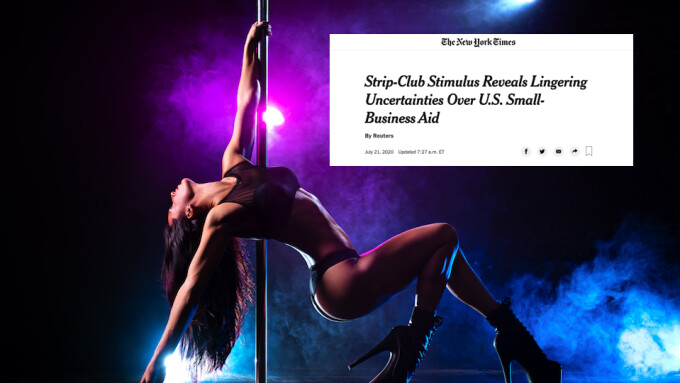PHILADELPHIA/WASHINGTON, D.C. — The New York Times has published a report by Reuters journalists surveying the confusing, discriminatory language about “prurient” businesses embedded in the Small Business Administration (SBA)’s loan applications for COVID-19 relief.
“Nearly four months since the launch of the loan initiative known as the Paycheck Protection Program (PPP),” the reporters wrote, “it is still unclear whether the SBA can make it rain” for the strip clubs and other adult-oriented business.
The report continues, stating that “the Trump administration has barred companies that ‘present live performances of a prurient sexual nature’ from participating. Clubs sued, and two federal judges rebuked the SBA for excluding the establishments from receiving the forgivable loans meant to protect jobs amid the health crisis.”
As XBIZ reported in March when the loans were first offered by the federal government, the “prurient” clause on the SBA loan application form replicates mid-1990s, Clinton-era language designed to discriminate against sexually oriented businesses.
The form compels applicants to declare that they do not “present live performances of a prurient sexual nature or derive directly or indirectly more than de minimis gross revenue through the sale of products or services, or the presentation of any depictions or displays, of a prurient sexual nature.”
The word “prurient” is an imprecise, obscure word that means “appealing to unhealthy sexual interests” and was used by the U.S. Supreme Court in a landmark 1973 ruling. Several members of the adult entertainment community and First Amendment lawyers have pointed out that people who do not consider their sexual expression “unhealthy” are exempt from application of the “prurient” clause.
Today's Reuters report describes the PPP as “a government loan program that has been plagued by criticism — duplicate loans, borrowers without clear financial need, inconsistent data,” and calls “the strip-club uncertainties” another example of “confusion surrounding an initiative that pushed hundreds of billions of dollars out the door.”
"The ball is in the SBA’s court right now," said Brad Shafer, attorney for a group of strip clubs who convinced a judge for the District Court of the Eastern District of Michigan to order the SBA to consider the clubs’ loan applications. "We still don’t know the end of this story."
Using loan data released by the SBA earlier this month, Reuters “identified 36 organizations representing dozens of strip clubs across the country that were approved for between $11.15 million and $27.95 million worth of loans from the small business pandemic aid program. Some of the businesses received the funds after the court decision; others got the money from banks despite the ban.”
“All totaled, these companies saved 2,548 jobs, according to the government data,” the report continued.
To read the Reuters article “Strip-Club Stimulus Reveals Lingering Uncertainties Over U.S. Small-Business Aid,” visit the New York Times.








